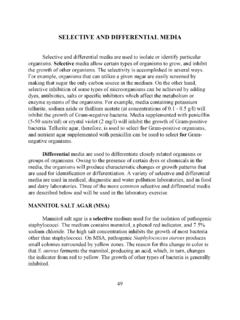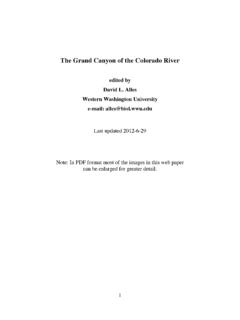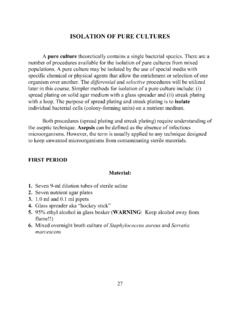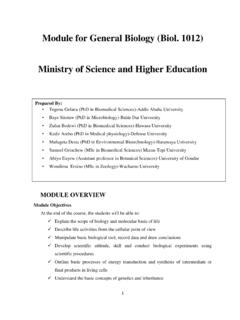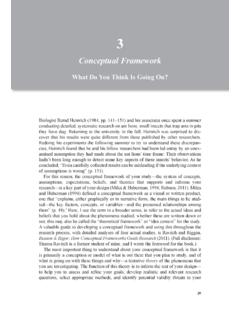Transcription of Lecture Notes for Biology 101: An Introduction to Science ...
1 1 Lecture Notes for Biology 101: An Introduction to Science and Biology for Non-Majors Instructor David L. Alles Course Outline The organization of this course has been driven by the goal of providing non-majors with a coherent picture of modern biological knowledge. To accomplish this goal it s necessary that each student gains an appreciation of the nature of Science and is introduced to the integrated view of our world that modern Science has produced. To facilitate this the course is divided into four parts.
2 Part One: The nature of Science There are three elements in defining Science : 1) the values of Science , 2) Science as a profession, and 3) the product of Science scientific knowledge. Using this definition, the goal of Part One is to introduce the fundamental nature of the scientific enterprise. Major Units: Defining Science The Epistemic Values of Science The Origin of Modern Science Science as a Profession Part Two: The Conceptual Framework of Biology The goal of Part Two is to introduce the conceptual framework of modern Biology .
3 Evolution and historical systems provide the conceptual framework or paradigm for understanding modern Biology . But a basic understanding and appreciation of molecular Biology is also necessary before we can begin to integrate all of biological knowledge. Major Units: Cosmological Evolution Natural Levels of Organization in the Physical World Biological Evolution Life as a Chemical Function Biochemistry & Genetics The Modern Synthesis Darwin and Mendel Part Three: The Integration of Biological Knowledge The purpose of Part Three is to show how biological knowledge can be integrated into a coherent picture of life on Earth.
4 Because life on Earth is an effectively closed historical system, we must understand that Biology is an historical Science . One result of this is that a chronological narrative of the history of life provides for the integration of all biological knowledge. 2 Major Units in Part Three: The Integration of Biological Knowledge Geologic Time The Origin of our Solar System The Origin of Life Photosynthesis Aerobic Respiration Endosymbiosis & Eukaryotic Cells The Classification of Life Sexual Reproduction Multicellularity Adaptive Radiations & Mass Extinctions Vertebrate Evolution Human Evolution Part Four.
5 Biology and Society Part Four attempts to show how modern biological knowledge directly affects the important social, ethical issues of our times. Major Units: Science & Ethics Human Population Growth The Sixth Extinction Why do Science ? ----------------------- The material that follows is taken from the Lecture Notes used in this course. It is hoped that by having them you will be able to concentrate on the verbal presentation of this material. However, these Notes do not contain the copyrighted material that will be presented in Lecture .
6 For quizzes and tests you are responsible for all the material that is presented. Therefore, if you wish to do well in this course, you must attend the lectures. ----------------------- 3 Part One: The nature of Science Unit One: Defining Science ------------------------ What is Science ? What is it that makes Science different? And different from what? Is there a scientific method? And if so, a method for doing what? What does the general public think about Science ? Is it good or bad? Why does our society support Science ?
7 Could we do without Science ? If not, what do we get by doing Science ? Why do Science ? ----------------------- Note: All indicators point to widespread support for government funding of basic research. The 2002, NSF survey of American adults found that 72% believe that the benefits of scientific research outweigh the harmful effects. In contrast, only 33% of Americans surveyed understand the nature of scientific inquiry well enough to make informed judgments about the scientific basis of results reported in the media (NSF, 2002).
8 ----------------------- Defining Science 1) As a set of rules for how to look at the world Epistemic Values 2) As a very human activity with all of the attendant failings Science as a Profession 3) As the product of the activity of Science Scientific Knowledge ------------------------ 4 ------------------------ A Legal Definition of Science Judge William R. Overton 1982: McLean versus the Arkansas Board of Education A descriptive definition was said to be that Science is what is accepted by the scientific community and is what scientists do.
9 The obvious implication of this description is that, in a free society, knowledge does not require the imprimatur [approval] of legislation in order to become Science ." This ruling was upheld by the Supreme Court in 1987. Note: A corollary to this ruling is that what qualifies as scientific knowledge is not decided by political majority vote, either at the level of local or state school boards, or by state or federal legislation. ----------------------- Unit Two: Epistemic Values Introduction : In trying to answer the question, What is it that makes Science different?
10 , we must examine the values of Science as a human endeavor. The first step in doing so is to understand the relationship between worldviews and values. ----------------------- Worldviews, Values, and Decision-making A worldview is our mental model of external reality. It consists of theories about the processes that operate in the external world or how the world works; theories as to the state of external reality or how the world is; theories of self-identity that are derived from our mental model of the world; and a set of values derived from our self-identity that assigns priorities in decision-making.


